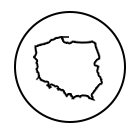Maria Urban from Świątniki
 Place
PlaceŚwiątniki
 People
PeopleUrban Maria
Maria Urban (from family Wawrzyńczyk) was born on December 5th, 1904 in Dąbrowa Górnicza. She lived in Świątniki near Wodzisławie (district Jędrzejowski).
„From 1922 she worked in the municipal office.” She was a single mother with four children. Her two sons worked in the structures of the Home Army, daughter helped to deliver food for starving Jews. Husband of Maria, Stanisław was killed on 17 April, 1940 in Katyń. He was an officer of fourth regiment of Infantry of the Kielce Legions.
On 20 of July, 1940 Maria made an official oath, in the resistance movement ZWZ, which was later transformed into the Polish Home Army. She was a member of the organization until 14th of January 1945, when to Jędrzejów village came the Red Army.
Maria worked in the Register of Population Movement Records of the Commune Office in Wodzisław. She used her work to: “print false identity documents for persons pursued by the occupant and for citizens of Jewish descent. The documents produced by Maria Urban made it possible for the fascists to avoid the repression, and for the citizens of Jewish origin created the chance of surviving the war. ”
Mary has assisted in many situations. Her daughter remembers, at least, several. For example, in the family home of the Urban family, two young women were hiding. Maria had completed for them the proper documents. Thanks to them women could get kenkarts.
„As a child I watched their joy from the documents they received, and I remember a warm goodbye to our family.” During the Warsaw Uprising she saved the Jew named Gross and her son Kuba.” The daughter of a woman was killed in the Warsaw ghetto. Ms. Gross often came to the Urban home, though more often Maria sent her daughter to give food for the family. One day the daughter told her that at their apartment she noticed a foreign man. In response she heard: „He’s hiding and must survive the war.” The man survived.
Often the clerk with whom the woman worked had warned her that what she was doing was extremely dangerous and threatened her with death.”Working in this way, Maria Urbanowa saved about 500 people. She did it selflessly, as Poland patriot, a member of the resistance movement”. After the war, people came to Maria’s home, wanted to thank her for her courage and risk of her life to save others.”
Among them was, in particular, a Jew, Aleks Lainweber. „[…] I remember the episode from 1961, when a sleek, high-ranking naval officer drove up to the grandmother’s house. I remember a white coat, which made a huge impression on me. The officer knelt before my grandmother, kissing her hand, thanking for something that had happened in the past. Much later I learned that he obliged to my Grandmother his life”. In memory of the grandson of Maria Urban – Andrzej Mazur – another event was recorded: after the war a delegation from Israel arrived in Wodzisław. Jews visited the house of Maria. „They talked to my grandma like to an old good friend.”
Maria urban died in 1986. Throughout her life she did what her conscience had dictated. The actions of the woman subsisted in the hearts and minds of several hundred people whom she helped.
Bibliography:
- FLV, Relacja Andrzeja Mazura [wnuczek], [brak daty].
DOCUMENTS:
No extra materials